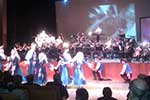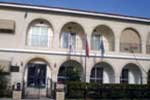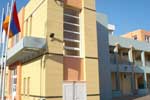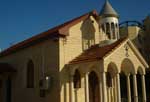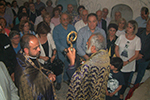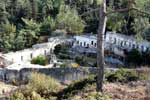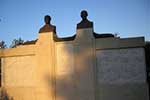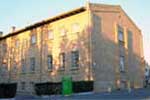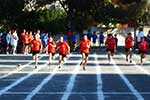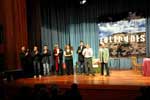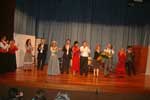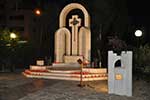Հարութ Սասունյանի սյունակը

Hanging Armenia’s Dirty Laundry in Public
President Serzh Sargsyan made an important appearance at the Parliamentary Assembly of the Council of Europe (PACE) in Strasbourg last week. In a whirlwind 30-minute speech, he covered Armenia's internal and foreign affairs, presenting his country in the best possible light before a distinguished foreign audience.
On the domestic front, Pres. Sargsyan spoke about fighting corruption, holding "fair and transparent elections," and overcoming "the consequences of the tragic events of March 2008."
The President then reminded the European Parliamentarians about Armenia's "shared historical and cultural legacy" with Europe and discussed the ongoing negotiations to resolve the Artsakh (Karabagh) conflict. He condemned "the extreme level of Armenophobia and racism" in Azerbaijan, and spoke of the difficulty of making "a concession to the side that is looking for a convenient excuse to shoot at us."
Pres. Sargsyan went on to accuse the Turkish government of undermining the "normalizaton" of Armenia-Turkey relations "by setting preconditions and failing to honor its commitments, which rendered the ratification of the signed Protocols impossible." He called on Turkey and Azerbaijan to end the "unlawful blockade imposed on Armenia" and accused Turkey of "not only failing to recognize, but also engaging in a policy of blunt denial of the Genocide of Armenians committed in the Ottoman Empire in 1915." He pledged that Armenians and all those concerned with crimes against humanity "will henceforth remain focused on the international recognition of the Armenian Genocide."
After his speech, Pres. Sargsyan spent another 30 minutes answering questions from PACE delegates representing Lithuania, France, Switzerland, Russia, Moldova, Holland, Armenia, and Ireland. Five Azerbaijanis had placed their names on the list of Parliamentarians to ask questions, but none of them did so. The delegates from Turkey had also made a unanimous decision not to question the Armenian President, as reported by Hurriyet Turkish newspaper.
The question that attracted most attention was the one asked by Parliamentarian Zaruhi Postanjyan from Armenia, a member of the opposition Heritage Party. She told Pres. Sargsyan: "Since an authoritarian regime has been established in Armenia and all elections from 1995 on have been rigged," wouldn't it be preferable if he organized special and fair elections and then "resigned"?
As the Turkish President of PACE, Mevlut Cavusoglu snickered at the question, Pres. Sargsyan calmly responded that he was well aware of Ms. Postanjyan's views which she had freely expressed in the Armenian Parliament, on the street and in the media. He added that he was not prepared to hold special elections because it is neither necessary nor constitutionally feasible to organize such elections. He urged Ms. Postanjyan to participate in the next regularly-scheduled parliamentary elections.
Not surprisingly, Pres. Sargsyan's PACE speech was welcomed by his supporters and criticized by his opponents at home. The most important issue for all concerned should have been whether the President's impressive words would translate into action in the near future. However, the immediate controversy revolved around the appropriateness of Ms. Postanjyan's criticism of the President, while on foreign soil.
Some Armenian politicians were of the opinion that it was improper for Ms. Postanjyan "to attack" Pres. Sargsyan in the chambers of the European Council. Others felt that her "harsh words" inadvertently made the President look good, because in a truly "authoritarian regime," she would have been excluded from Armenia's delegation, stripped of her parliamentary immunity and prosecuted. In fact, some European Parliamentarians wondered whether Turkish or Azeri delegates would dare to criticize their President at PACE?
American politicians use the expression "politics stops at the water's edge" to indicate their willingness to set aside internal disputes for the sake of presenting a united front to outsiders. Applying that adage to Armenia, one could question the wisdom of making such disparaging comments before the Council of Europe, regardless of whether one agrees with the President or his policies. Since Armenia is routinely attacked by Turkish and Azerbaijani delegates in international forums, it is unwise to add one's voice to those tarnishing Armenia's reputation.
This issue also comes up when some Armenians try to pressure their authorities by taking their internal disputes to foreign governments and international courts. While their frustration is understandable, dragging a foreign entity into an internal dispute detracts from Armenia's image overseas. In such cases, however, the blame must be shared by the Armenian government for failing to ensure the integrity of domestic courts, thereby forcing citizens to turn elsewhere for justice.
Before making critical comments about Armenia's leadership outside the country, especially by Parliament members who have ample opportunity to express their views at home, one must weigh the benefits of pressuring the authorities to respect the people's rights with the damage caused to the country's international reputation.
By Harut Sassounian
Publisher, The California Courier




